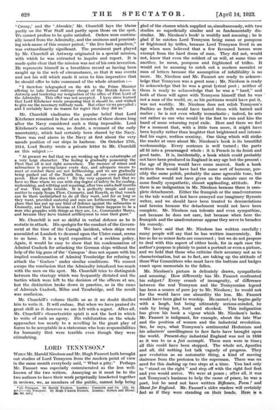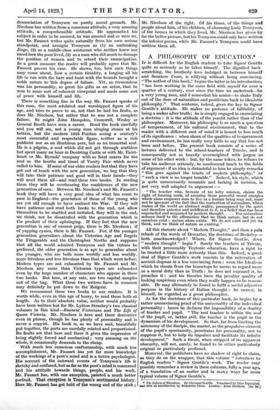LORD TENNYSON.* WHEN Mr. Harold Nicolson and Mr. Hugh Fausset
both brought out studies of Lord Tennyson from the modern point of view in the same month everybody said, " What a pity." Perhaps Mr. Fausset was especially commiserated as the less well- known of the two writers. Annoying as it must be to the two authors to have their work perpetually bracketed together in reviews, we, as members of the public, cannot help being • (1) Tennyson. By Harold Nicolson. London : Constable and Co. ed. flet.1—(2) Tennyson. By Hugh I'Anson Fewest. London: Selwyn and Blount. glad of the chance which supplied us, simultaneously, with two studies so superficially similar and so fundamentally dis- similar. Mr. Nicolson's book' is worldly and amusing ; he is glad if he catches Lord Tennyson being mean or pompous or frightened by trifles, because Lord Tennyson lived in an age when men believed that a few favoured heroes were exempt from the hard doom of man. They did not, would not, know that even the noblest of us will, at some time or another, be mean, pompous and frightened of trifles. It would not be amusing to catch out a modern moralist or man of letters because the assumption of infallibility is no more. Mr. Nicolson and Mr. Fausset are ready to acknow- ledge that Tennyson was a great man ; Mr. Nicolson is ready to acknowledge that he was a great lyrical poet ; neither of them is ready to acknowledge that he was a " bard," and both of them will agree with Tennyson himself that he was not a man of the world, or, as his partisans would have put it, was not worldly. Mr. Nicolson does not relish Tennyson's frailties as Swift would have tasted them with hatred and malice ; he is not even wholly iconoclastic ; indeed, he sets out rather as one who would be the first to run and kiss the hand of some returning royal exile. Here and there we feel for a moment that, with a little turn more, it might have been loyalty rather than laughter that brightened and intensi- fied his eager, restless scrutiny. One thing which will strike the reader at once about Mr. Nicolson's book is its beautiful workmanship. Every sentence is well turned ; the parts all fit into a prearranged whole : it is French in its finish and good taste. It is, incidentally, a book which could probably not have been produced in England in any age but the present : the age of Byron would have come nearest. Such a book written then would have had the same sort of humour, pos- sibly the same polish, probably the same agreeable tone, but its author would not have given us the minute care or the same finally sympathetic, almost applauding, attitude. For there is no indignation in Mr. Nicolson because there is -com- plete detachment. Either the frumpish or the unadventurous in the tale would at last have annoyed our imaginary Byronic writer, and we should have been treated to denunciations and heroics because the detachment would not have been complete. Mr. Nicolson can tolerate and even sympathize, not because he does not care, but because when here the frumpish and the unadventurous appear they serve to broaden his comedy.
We have said that Mr. Nicolson has written carefully ; many people will say that he has written inaccurately. He has as far as minor facts are concerned ; but we do not propose to deal with this aspect of either book, for in each case the author's purpose is plainly to paint a portrait or even a picture, and we hold that those who criticize their accuracy not as to characterization, but as to fact, are taking up the attitude of those War Committees who must have the buttons and badges exact upon memorials to the fallen.
Mr. Nicolson's, picture is delicately drawn, sympathetic and amusing. How differently has Mr. Fauiset confronted his subject? Every crumb of incongruity, of difference between the real Tennyson and the Tennysonian legend has been a source of pure joy to Mr. Nieolson; he would not for the world have one absurdity the less. Mr. Fausset would have been glad to worship. He cannot ; he begins gaily with a laugh, but being ultimately serious-minded, he ends by being hot, hurt and shocked. This indignation has given his book a vigour which Mr. Nicolson's lacks. Mr. Fausset is indignant, for example, about the late War' and the position of women and the industrial revolution. See, he says, what Tennyson's sentimental Hedonism and , his admirers' unwillingness to face facts have brought upon the world. Present-day industrial England was not in 1850 as it was to us a fail accompli. These men were in time ; all this could have been stopped. The whole set, Apostles and all, did nothing but talk vaguely of progress. They saw evolution as an automatic thing, a kind of moving staircase from the protozoa to the superman. There was no need for this dashing up two steps at a time. You had only to " stand on the right " and step off with the right foot first and you would arrive. We were at peace ; after all, it was not Tennyson's business to help the cause of peace, he was a poet, but he need not have written Riflemen, Form ! and Shout for England. Mr. Fausset's older readers will certainly feel as -if they were standing on their heads. Here is se, . _
denunciation of Tennyson on purely moral grounds. Mr. Nicolson has written from a conscious attitude, a very amusing attitude, a comprehensible attitude. He approached his subject in order to be amused, he was amused and so were we, but Mr. Fausset writes quite naturally from his own serious standpoint, and arraigns Tennyson as (1) an unthinking Jingo, (2) as a middle-class aristocrat who neither knew nor cared how the poor lived, (3) as a man who did much to damage the position of women and to retard their emancipation. In a great measure the reader will probably agree that Mr. Fausset proves his case. He shows, too, how such things may come about, how a certain timidity, a longing all his life to run with the hare and hunt with the hounds brought a noble nature to this degree of failure. Yet, so tremendous was his personality, so great his gifts as an artist, that he won to some sort of coherent viewpoint and made some sort of peace with himself and life.
There is something fine in the way Mr. Fausset speaks of this man, the most adulated and worshipped figure of his age, and tries to prove to us, not that he had his faults, as does Mr. Nicolson, but rather that he was not a complete failure. So might John Hampden, Cromwell, Wesley or General Booth have seen a career. Read the book carefully and you will see, not a young man slinging stones at his betters, but the modern 1923 Puritan seeing a century's most successful and respectable figure, neither as a rich publicist nor as an illustrious peer, but as an immortal soul. He is a pilgrim, a soul which did not get through scathless but spent many an hour in Doubting Castle or with Mr. Faint- heart or Mr. Byends' company with as fatal snares for the soul as the booths and tinsel of Vanity Fair which never called to him. If some of our elder readers feel that they have got out of touch with the new generation, we beg that they will take their patience and good will in their hands—they will need them all—and read these two books. In reading them they will be overhearing the confidences of the new generation of men. Between Mr. Nicolson's and Mr. Fausset's book they will have a very good idea of what has come to pass in England—the generation of those of the young who are yet old enough to have realized the War. If they will have patience and read both books to the end, not allow themselves to be startled and irritated, they will in the end, we think, not be dissatisfied with the generation which is the product of their upbringing. If they feel that the new generation is one of earnest prigs, there is Mr. Nicolson ; if of yapping cynics, there is Mr. Fausset. For, if the younger generation generalizes -about the Victorian Age and forgets the Fitzgeralds and the Christopher Norths and supposes that all the world admired Tennyson and the virtues he preferred, the older generation is as apt to generalize about the younger, who are both more worldly and less worldly, more frivolous and less frivolous than that which went before. Modern types are not exhausted by Mr. Fausset and Mr. Nicolson any more than Victorian types are exhausted even by the large number of characters who appear in these two books. But here, at any rate, are two capital samples out of the bag. What these two writers have in common may definitely be put down to the Zeitgeist.
We recommend these two books to our readers. It is worth while, even in this age of hurry, to read them both at length. As to their 'absolute value, neither would probably have been written but for Mr. Lytton Strachey's two classical volumes in this kind—Eminent Victorians and The Life of Queen Victoria. Mr. Nicolson is here and there derivative even in phrase, though he has plenty of personality and is never a copyist. His book is, as we have said, beautifully put together, the parts are carefully related and proportioned. Its faults are that here and there it gives the impression of being slightly forced and mechanical ; very amusing on the whole, it occasionally descends to the cheap.
With much less conscious craftsmanship, with much less accomplishment, Mr. Fausset has yet far more knowledge of the workings of a poet's mind and is a better psychologist. His account of the outward events of Tennyson's life is liketchy and confused, but as far as the poet's mind is concerned and his attitude towards things, people, and his work, Mr. Fausset has, with one exception, painted a much better portrait. That exception is Tennyson's sentimental history. Here Mr. Fausset has got hold of the wrong end of the stick ; Mr. Nicolson of the right. Of his times, of the things and people about him, of his children, of charming Lady Tennyson, of the homes in which they lived, Mr. Nicolson has given by far the better picture, but his Tennyson could only have written the inferior poems, while. Mr. Fausset's Tennyson could have written them all.











































 Previous page
Previous page